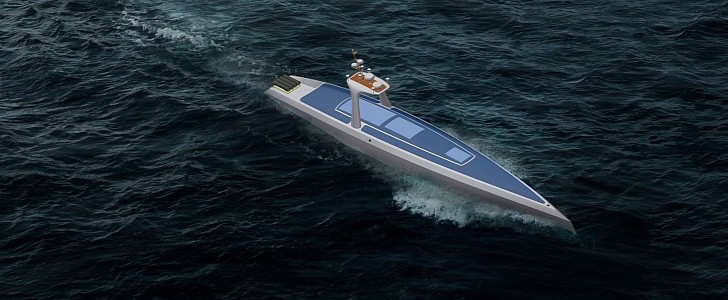There are multiple reasons why switching to autonomous vessels makes sense. It would reduce costs, and human errors, as well as improve safety at the same time, just to name some of the main advantages. Aware of all the benefits, Plymouth Marine Laboratory is working on developing the world’s first long-range autonomous research ship.
Oceanus will be designed and built by Plymouth-based M Subs Ltd. We only have some plans and drawings so far but even so, you can tell the vessel has a sleek, futuristic look to it. It will be 24 m (78.7 ft) long, with a beam of 3.5 m (11.4 ft), it will be lightweight, and mono-hulled. As it is meant to help scientists with their research in areas such as climate change, biodiversity, biogeochemistry, or fisheries, it will be capable of carrying a variety of sensors that can collect valuable data.
With environmental responsibility in mind, Oceanus will be powered not just by a fuel-efficient diesel engine but also by on-board micro-energy generation devices and by solar power, thanks to the panels on the deck, as explained by Plymouth Marine Laboratory. Fuel consumption will be drastically reduced because there will be no crew onboard the vessel to add to the ship's weight, nor will there be any living facilities. We are still waiting for info on the vessel's exact range capabilities.
Scientists hope that Oceanus will be able to make transatlantic sampling voyages from the U.K. to the Falklands and will eventually enable a remote AMT (Atlantic Meridional Transect), which is an annual marine research expedition on the Atlantic. The first such voyage took place in 1995.
While Oceanus is still in its designing phase, we already have examples of autonomous vessels that managed to cruise the waters controlled entirely remotely. One of them is the Nellie Bly, which completed the world’s first 1,000+ nautical miles (1,852+ km) voyage back in fall, in the waters of Germany and Denmark. Then there’s also Suzaku, a 749 GT cargo ship that recently took a 490-mile (790 km) trip in Japan using only AI (artificial intelligence) technologies.
With environmental responsibility in mind, Oceanus will be powered not just by a fuel-efficient diesel engine but also by on-board micro-energy generation devices and by solar power, thanks to the panels on the deck, as explained by Plymouth Marine Laboratory. Fuel consumption will be drastically reduced because there will be no crew onboard the vessel to add to the ship's weight, nor will there be any living facilities. We are still waiting for info on the vessel's exact range capabilities.
Scientists hope that Oceanus will be able to make transatlantic sampling voyages from the U.K. to the Falklands and will eventually enable a remote AMT (Atlantic Meridional Transect), which is an annual marine research expedition on the Atlantic. The first such voyage took place in 1995.
While Oceanus is still in its designing phase, we already have examples of autonomous vessels that managed to cruise the waters controlled entirely remotely. One of them is the Nellie Bly, which completed the world’s first 1,000+ nautical miles (1,852+ km) voyage back in fall, in the waters of Germany and Denmark. Then there’s also Suzaku, a 749 GT cargo ship that recently took a 490-mile (790 km) trip in Japan using only AI (artificial intelligence) technologies.







